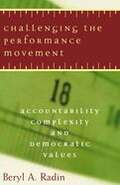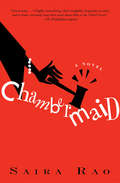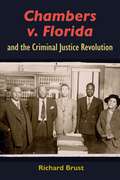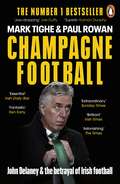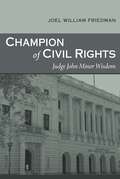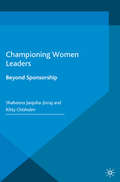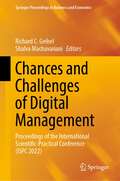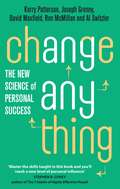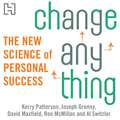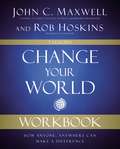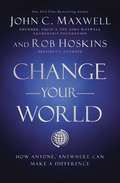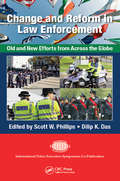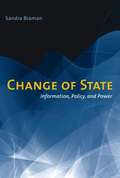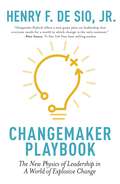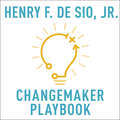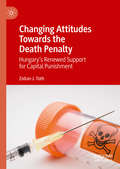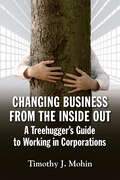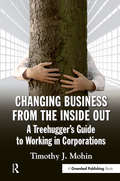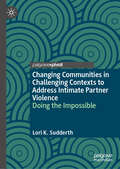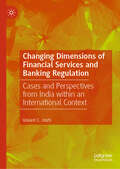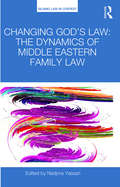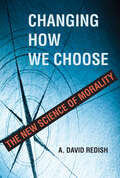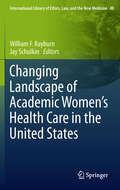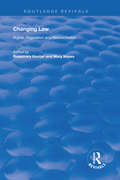- Table View
- List View
Challenging the Performance Movement: Accountability, Complexity, and Democratic Values
by Beryl A. Radin"Accountability" is a watchword of our era. Dissatisfaction with a range of public and private institutions is widespread and often expressed in strong critical rhetoric. The reasons for these views are varied and difficult to translate into concrete action, but this hasn't deterred governments and nongovernmental organizations from putting into place formal processes for determining whether their own and others' goals have been achieved and problems with performance have been avoided. In this thought-provoking book, government and public administration scholar Beryl Radin takes on many of the assumptions of the performance movement, arguing that evaluation relies too often on simplistic, one-size-fits-all solutions that are not always effective for dynamic organizations. <p><p>Drawing on a wide range of ideas, including theories of intelligence and modes of thought, assumptions about numbers and information, and the nature of professionalism, Radin sheds light on the hidden complexities of creating standards to evaluate performance. She illustrates these problems by discussing a range of program areas, including health efforts as well as the education program, "No Child Left Behind." Throughout, the author devotes particular attention to concerns about government standards, from accounting for issues of equity to allowing for complicated intergovernmental relationships and fragmentation of powers. She explores in detail how recent performance measurement efforts in the U.S. government have fared, and analyzes efforts by nongovernmental organizations both inside and outside of the United States to impose standards of integrity and equity on their governments. The examination concludes with alternative assumptions and lessons for those embarking on performance measurement activities.
Chambermaid: A Novel
by Saira RaoAn honorable, aspiring attorney&’s dream job becomes a dishonorable nightmare in this &“funny and charming&” debut (Gary Shteyngart, author of Lake Success). Sheila Raj is a recent graduate of Columbia Law School with high aspirations of working for the ACLU. When she lands a coveted year-long federal clerkship with legal goddess Judge Helga Friedman, she cannot help but think that her life is destined for jurisprudential greatness. But law school did not prepare Sheila for the sociopath who greets her on her first day, and pushes her to the brink of resignation. It&’s only when she&’s assigned to a high-profile death penalty case that Sheila realizes that to survive the year as Friedman&’s chambermaid—not just her sanity, but actual lives will hang in the balance. Because Prada be damned, &“the devil really wears a black robe&” (Jill Kargman, author of Momzillas). &“In the world of the federal judiciary, where judges are sacrosanct and impervious to criticism, Saira Rao&’s deliciously controversial debut novel ranks with mooning the Supreme Court&” (The Philadelphia Inquirer). Delivering an outrageous peek into hallowed halls, the &“laugh out loud . . . Chambermaid is sure to strike a familiar chord for anyone who&’s ever had a jerk for a boss&” (Pittsburgh Post-Gazette).
Chambers v. Florida and the Criminal Justice Revolution (Government and Politics in the South)
by Richard BrustThis book explores the history and enduring legacy of Chambers v. Florida, a landmark ruling that banned confessions obtained through mental or physical coercion in criminal trials and contributed to what is now known as the “criminal procedure revolution.”
Champagne Football: John Delaney and the Betrayal of Irish Football: The Inside Story
by Paul Rowan Mark TigheTHE NO.1 BESTSELLER!'I read it in one sitting, it's a superb book' Eamon Dunphy, The Stand 'An astonishing exposé' Martin Ziegler, The TimesOver the course of fifteen years, John Delaney ran the Football Association of Ireland as his own personal fiefdom. He had his critics, but his power was never seriously challenged until 2019, when Mark Tighe and Paul Rowan published a sequence of stories in the Sunday Times containing damaging revelations about his personal compensation and the parlous financial situation of the FAI. Delaney's reputation as a great financial manager was left in tatters. He resigned under pressure, and the FAI was left hoping for a massive bail-out from the Irish taxpayer.Champagne Football is a gripping, sometimes darkly hilarious and often enraging piece of reporting by the award-winning journalists who finally pulled back the curtain on the FAI's mismanagement.____________'Excellent' Irish Sun'A jaw-dropping story ... brilliant' Irish Times'Essential reading' Irish Daily Star'Astonishing ... Side-splittingly hilarious' Guardian'A damning account' Sunday Independent'An instant classic, one of the all-time great Irish sports books' Alan English'Excellent ... includes staggering detail' Daily Mail'A cracking read ... [An] incredible amount of jaw-dropping detail' Matt Cooper 'One of the most hotly-anticipated sport books of the year' Brendan O'Connor 'A masterpiece' Tommy Martin'At last, the truth of his ruinous reign has been rigorously and painstakingly exposed' Irish Daily Mail 'An absolutely extraordinary book' Eoin McDevitt, Second Captains 'Remarkable. The desperate story of Irish football but also a book about how Ireland works. Outstanding' Dion Fanning
Champion of Civil Rights: Judge John Minor Wisdom (Southern Biography Series)
by Joel William FriedmanOne of the least publicly recognized heroes of the civil rights movement in the United States, John Minor Wisdom served as a member of the U.S. Court of Appeals for the Fifth Circuit from 1957 until his death in 1999 and wrote many of the landmark decisions instrumental in desegregating the American South. In this revealing biography, law professor Joel William Friedman explores Judge Wisdom's substantial legal contributions and political work at a critical time in the history of the South.In 1957, President Eisenhower appointed Wisdom to the Fifth Circuit, which included some of the most deeply segregated southern states: Alabama, Florida, Georgia, Louisiana, Mississippi, and Texas. In the tumultuous two decades following its decision in Brown v. Board of Education, the Supreme Court issued only a few civil rights decisions, preferring instead to affirm Fifth Circuit Court opinions or let them stand without hearing an appeal. Judge Wisdom, therefore, authored many of the decisions that transformed the South and broke down barriers of all kinds for African Americans, including the desegregation of public schools.In preparing this first full-length biography of Judge Wisdom, Friedman had unrestricted access to Wisdom's voluminous repository of personal and professional papers. In addition, he draws on personal interviews with law clerks who served under Judge Wisdom, resulting in a unique, behind-the-scenes account of some of the nation's most important legal decisions: the admission of the first black student to the University of Mississippi, the initiation of contempt proceedings against Mississippi Governor Ross Barnett, and the destruction of obstacles that had previously kept black Americans from voting. Friedman also explores Wisdom's political life prior to joining the federal bench, including his pivotal role in resurrecting the Louisiana Republican Party and in securing the Republican presidential nomination for Eisenhower.A compelling account of how a child of privilege from one of America's most socially and racially stratified cities came to serve as the driving force behind the legal effort to end segregation, Champion of Civil Rights offers judicial biography at its best.
Championing Women Leaders: Beyond Sponsorship
by Kitty Chisholm Shaheena Janjuha-JivrajChampionship is the key differentiator between women who achieve leadership roles and those who don't. This book examines the reasons why championing works and why it is so important for female executive development in particular, and provides a user-friendly guide to develop workplace champions for female leaders in any organization
Chances and Challenges of Digital Management: Proceedings of the International Scientific-Practical Conference (ISPC 2022) (Springer Proceedings in Business and Economics)
by Richard C. Geibel Shalva MachavarianiThis book presents selected contributions to the International Scientific-Practical Conference 2022 (ISCP 2022) organized by East European University (Georgia) and E-Commerce Institute (Germany). It discusses the possibilities of digital management under current conditions, highlights recent technological advances, and addresses further marketing perspectives. The topics covered include digitalization, digital transformation, e-commerce, artificial intelligence, big data, blockchain, online marketing, the transformation of small and medium-sized businesses, digital law, digital social innovation, and digital ethics.
Change Anything: The new science of personal success
by Kerry Patterson Joseph Grenny Al Switzler David Maxfield Ron McMillanSo often we want to make big changes in our lives, but lack the resolve to see them through. It seems we just can't summon the necessary willpower to take on these huge challenges - saving money, quitting smoking, increasing productivity, getting a promotion or pay rise, or losing weight. But here's the secret: willpower is not the answer. With a clearer understanding of the real forces that shape our actions, we can make better decisions, change our outlook, and rid ourselves of bad habits.CHANGE ANYTHING, reveals the Six Sources of Influence that affect our daily decisions and explains how you can make them work in your favour, helping you to achieve your goals. By learning how they apply to your life, you can put these subtle but strong forces to use in a positive way that brings real results. Based upon the latest psychological and medical research, this book details a variety of real world examples that will empower you to re-examine the way you go about your business and your life and will provide you with the tools to CHANGE ANYTHING.
Change Anything: The new science of personal success
by Kerry Patterson Joseph Grenny Al Switzler David Maxfield Ron McMillanSo often we want to make big changes in our lives, but lack the resolve to see them through. It seems we just can't summon the necessary willpower to take on these huge challenges - saving money, quitting smoking, increasing productivity, getting a promotion or pay rise, or losing weight. But here's the secret: willpower is not the answer. With a clearer understanding of the real forces that shape our actions, we can make better decisions, change our outlook, and rid ourselves of bad habits.CHANGE ANYTHING reveals the Six Sources of Influence that affect our daily decisions and explains how you can make them work in your favour, helping you to achieve your goals. By learning how they apply to your life, you can put these subtle but strong forces to use in a positive way that brings real results. Based upon the latest psychological and medical research, this book details a variety of real world examples that will empower you to re-examine the way you go about your business and your life and will provide you with the tools to CHANGE ANYTHING.
Change Your World Workbook: How Anyone, Anywhere Can Make a Difference
by John C. Maxwell Rob HoskinsTake action and start making an impact today right where you are.John Maxwell and Rob Hoskins have invested their lives as champions of change. Maxwell's organizations EQUIP and the John Maxwell Leadership Foundation have transformed communities by training more than five million leaders from literally every country in the world. Hoskins's One Hope has transformed the lives of more than one billion children and youth in 120 countries around the globe.Now, for the first time, these two leaders have partnered to write a book about how anyone, anywhere, can transform their world. Offering practical principles based on solid research and real-life experience, the authors teach how to recognize where and how to get started, who to recruit, when to mobilize people, what to do, how to communicate, and how to know when they've really hit the target. This accompanying workbook integrates the power of Maxwell's familiar and engaging leadership communication with the research-based international insights of Hoskins's and One Hope global experience.Transformation is within the reach of anyone who is willing to think, speak, and act in a way that values people and collaborates with them to bring about lasting positive change. This workbook will give them the tools to go through the steps, based on the trade book, to make that happen in their lives.
Change Your World: How Anyone, Anywhere Can Make A Difference
by John C. Maxwell Rob HoskinsWhatever the desire of your heart—better schools, better neighborhoods, more positive workplaces, more connected families, or more engaged communities—Change Your World will guide you through the entire process to take action and start making an impact today right where you are.You can bring about positive, lasting change in the world, and you don&’t have to be rich and famous or lead a big organization to do it.Global leadership and development icons John C. Maxwell and Rob Hoskins provide the inspiring and practical roadmap to get started being the change you want to see—in your community and beyond.For many of us, the world we live in feels broken, yet change is easier than we think. Learn from the firsthand experiences shared by the authors from their work helping to transform communities, businesses, and millions of lives around the world.In Change Your World, they show you how toIdentify your causeLive out the values that make a differenceBecome a catalyst for changeJoin the right team or recruit one of your ownWork together with others to make a differenceMeasure your impact and keep improvingYou&’ll not only be encouraged to make a difference based on the needs you see around you; you&’ll be equipped to take action and start making an impact today.
Change and Reform in Law Enforcement: Old and New Efforts from Across the Globe (International Police Executive Symposium Co-Publications)
by Scott W. Phillips and Dilip K. DasThis book provides broad exposure to a variety of policing reforms that have not received adequate attention. It includes information and examples from different countries regarding efforts to change aspects of policing that are problematic or involve changes in the way crimes are committed. Some of the efforts to improve the police are relatively recent (i.e., using social media) and some areas of policing that seem to require frequent attention (i.e., working with the public).
Change of State: Information, Policy, and Power
by Sandra BramanAs the informational state replaces the bureaucratic welfare state, control over information creation, processing, flows, and use has become the most effective form of power. In Change of State Sandra Braman examines the theoretical and practical ramifications of this "change of state." She looks at the ways in which governments are deliberate, explicit, and consistent in their use of information policy to exercise power, exploring not only such familiar topics as intellectual property rights and privacy but also areas in which policy is highly effective but little understood. Such lesser-known issues include hybrid citizenship, the use of "functionally equivalent borders" internally to allow exceptions to U.S. law, research funding, census methods, and network interconnection. Trends in information policy, argues Braman, both manifest and trigger change in the nature of governance itself. After laying the theoretical, conceptual, and historical foundations for understanding the informational state, Braman examines 20 information policy principles found in the U.S Constitution. She then explores the effects of U.S. information policy on the identity, structure, borders, and change processes of the state itself and on the individuals, communities, and organizations that make up the state. Looking across the breadth of the legal system, she presents current law as well as trends in and consequences of several information policy issues in each category affected. Change of State introduces information policy on two levels, coupling discussions of specific contemporary problems with more abstract analysis drawing on social theory and empirical research as well as law. Most important, the book provides a way of understanding how information policy brings about the fundamental social changes that come with the transformation to the informational state.
Changemaker Playbook: The New Physics of Leadership in a World of Explosive Change
by Henry De SioOur one-leader-at-a-time past has given way to a present reality where everyone has the potential to lead in every aspect of life. We all have at our fingertips the tools of change that were once available to just a few - and The shift from one-leader-at-a-time to everyone-leading-in-every-moment has created a changemaker effect on society. Change is no longer linear and faster, it's explosive and omnidirectional.THE CHANGEMAKER PLAYBOOK will show you how to thrive in every aspect of today's transformed societal landscape.A tutorial on the principles of empathy-based ethics and co-creative teamwork, THE CHANGEMAKER PLAYBOOK is as much a leadership handbook as it is a guide to personal achievement. Based on the author's discoveries about leading in change from front-edge thinkers - business and social entrepreneurs, educators, media thought leaders and youth changemakers - who distinguish themselves by putting their bold ideas and entrepreneurial capacities to work for the good of all, readers can apply the principles in this bookto every aspect of their lives.This book is less about getting ahead and more about getting along - because in the world we have entered, this is the central principle underlying the new success formula.
Changemaker Playbook: The New Physics of Leadership in a World of Explosive Change
by Henry De SioLearn how to be a changemaker and drive positive change through leadership and innovation at every level.Our one-leader-at-a-time past has given way to a present reality where everyone has the potential to lead in every aspect of life. We all have at our fingertips the tools of change that were once available to just a few - and The shift from one-leader-at-a-time to everyone-leading-in-every-moment has created a changemaker effect on society. Change is no longer linear and faster, it's explosive and omnidirectional.THE CHANGEMAKER PLAYBOOK will show you how to thrive in every aspect of today's transformed societal landscape.A tutorial on the principles of empathy-based ethics and co-creative teamwork, THE CHANGEMAKER PLAYBOOK is as much a leadership handbook as it is a guide to personal achievement. Based on the author's discoveries about leading in change from front-edge thinkers - business and social entrepreneurs, educators, media thought leaders and youth changemakers - who distinguish themselves by putting their bold ideas and entrepreneurial capacities to work for the good of all, readers can apply the principles in this bookto every aspect of their lives.This book is less about getting ahead and more about getting along - because in the world we have entered, this is the central principle underlying the new success formula.(P) 2021 Hodder & Stoughton Ltd
Changing Abortion Laws in Mexico Through Advocacy and Human Rights: When Federalism Came to Life (Routledge Advances in International Relations and Global Politics)
by Clara Eugenia Franco YáñezChanging Abortion Laws in Mexico Through Advocacy and Human Rights presents the recent evolution of abortion laws in Mexico (2007–2021) and how advocates have shaped them through human rights discourses, challenging social norms.Utilizing extended expert interviews, it offers a uniquely deep dive into the mapping of Mexico’s recent legal landscape concerning abortion, addressing an issue of concern for contemporary feminist movements. By thoroughly analyzing this debate as it happened ‘on the ground’ in Mexico, the author examines how activists (for and against legal abortion) have shaped norms and laws, analyzing their proposals for legal and public policy reforms. The book maps out this sociopolitical and legal landscape throughout the past decade, beginning with abortion legalization in Mexico City in 2007, throughout the political backlash that ensued in other subnational states, and culminating with the Supreme Court’s decision in 2021 to decriminalize abortion. The Mexican case is explored through a dual lens: firstly by ‘zooming in’ to Mexico as a country case where federalism makes for a complex and fascinating legal landscape, and secondly by ‘zooming out’ to networks of transnational advocates and their linkages to global norms and institutions. The concluding considerations provide closing reflections on ‘the abortion in Mexico story’ and the ways in which advocates on this and other issue areas might find ways to advance ideas, normative concepts, find common ground with ideological opponents, and implement successful policy change.This book will be of great interest to students and scholars of Politics and International Relations, International Law, Feminist Studies, and Latin American Studies.
Changing Attitudes Towards the Death Penalty: Hungary’s Renewed Support for Capital Punishment
by Zoltan J. TothThis book explores the pros and cons of the death penalty and the history of capital punishment. In this context, it puts a special emphasis on the situation in Hungary, where, amongst its neighbors, in recent years the demand for the reestablishment of the death penalty has received the strongest political support from many pro-government politicians. Toth presents tendencies toward abolition of the death penalty and analyzes the arguments by which the death penalty can, in principle, be criticized or even defended. The book presents the main issues of the death penalty, arguments of both abolitionists and retentionists, and reviews the modern history of this sanction. The monograph does not seek to convince the reader of the correctness or wrongness of the death penalty, but presents the arguments and counter-arguments objectively, without bias, reviewing the standpoints of both sides authentically, leaving the reader the right to choose and allowing discussion and argumentation to be informed.
Changing Business from the Inside Out: A Tree-Hugger's Guide to Working in Corporations
by Tim MohinThe BP oil spill, the 2008 global financial collapse, and revelations of scandalous working conditions at Chinese electronics supplier Foxconn show why so many are suspicious of promises of corporate responsibility. But slowly and fitfully, corporations are changing. It’s not just because of the high cost of making amends and a fear of negative publicity. Consumers are demanding better corporate behavior, and an increasing number of executives are eager to make their organizations more of a force for good. But corporations can’t act in responsible ways if no “treehuggers” are working inside the system to lead the effort. For more than two decades, Timothy J. Mohin has worked to improve working conditions, clean up factories, and battle climate change—all while being employed by some of the biggest companies in the world. In Changing Business from the Inside Out he’s written the first practical, authoritative insider’s guide to creating a career in corporate responsibility. Mohin describes how to get started and what the day-to-day experience of being “the designated driver at the corporate cocktail party” is really like. He recounts colorful case studies from his own career, provides advice on how CSR workers can have greater impact, and even looks into how employees in other corporate functions can make a difference. He details the programs and processes needed to support a comprehensive CSR effort, but perhaps most importantly, he identifies the personal and professional skills needed to navigate corporate politics and get buy-in from sometimes skeptical colleagues. With more than 80 percent of the Fortune 500 now publishing “sustainability reports,” a new career path has been forged in corporate responsibility. From strategy to data mining to supply chains and communication, this book is the “operator’s manual” for this new career path.
Changing Business from the Inside Out: A Treehugger’s Guide to Working in Corporations (Berrett-koehler Ser.)
by Timothy MohinCorporate responsibility is considered an oxymoron by much of society. Corporations are among the least trusted of our institutions; and the 2008 financial crisis, BP's oil spill in the Gulf of Mexico, and the collapse of the house of cards that was Enron have only added to public skepticism.So, at a time when trust in corporations has reached an all-time low, why is interest in corporate responsibility at an all-time high? A plausible explanation is that increasing numbers of stakeholders are demanding responsibility from corporations. Hyper-transparency of corporate activities, fueled by disclosure laws and the Internet, has increased awareness to the point where corporate behavior is under constant scrutiny. Smart business leaders are aware of this scrutiny and of the high costs of a public scandal. They know that in the long run it is cheaper to act responsibly now than to dig out from a PR disaster later.Tim Mohin is a veteran corporate responsibility practitioner who has led programs at Apple, Intel, and AMD. In this book, Tim tells us why he believes he is making a difference where it counts and how others can do the same. His book is a manual on how to steer the corporate supertanker toward doing good for people and our planet.Changing Business from the Inside Out provides a fascinating roadmap to the corporate responsibility and sustainability field, from beginning a career, to forming a program, to navigating the complicated politics of a corporation. Mohin likens the corporate treehugger role to "being the designated driver at the corporate cocktail party". Throughout his book, he argues strongly that activists can accomplish more for the planet and society by serving as a voice of responsibility within the corporation rather than protesting outside the factory gates. Corporations are clearly the drivers of the world economy, and the corporate responsibility practitioner has an essential role in bringing ethical and sustainable values to the C-suite and making sure that they are accomplished.Whether you are a practitioner needing advice, a mid-career professional wanting to change course, or an MBA wondering how to incorporate responsibility into your career, this book has the answers you need.
Changing Communities in Challenging Contexts to Address Intimate Partner Violence: Doing the Impossible
by Lori K. SudderthWomen around the world face substantial barriers to reporting their victimization, and in some contexts, the classical criminal justice response to violence can be muted, corrupted, or even inappropriate. This book discusses the strategies and efforts of advocates and activists to support survivors of intimate partner violence in isolated, rural, tribal and poor communities. It asks questions such as: how do you create safe space for survivors of intimate violence in places where people tend to know each other? And how do you create safe space for survivors in places with few resources or where tribal identity is key to mental health? Drawing on research from the Caribbean, Central America, and New Zealand, this book speaks to criminologists, social workers and those working with victim advocacy communities, on college campuses, and to policymakers who serve rural or tribal areas.
Changing Dimensions of Financial Services and Banking Regulation: Cases and Perspectives from India within an International Context
by Vasant C. JoshiThis book provides a review and preview of important emerging challenges facing financial regulators across the globe ranging from Federal Reserve (USA) to the Bank of Japan. It takes a perspective to anticipate where these challenges lie. Wherever appropriate, the book further examines these matters in the Indian context. Anticipating that central banks will be dealing with the after-effects of &“do what it takes&” monetary policy adopted during and after the financial crisis brought about by the pandemic, the book explores through its eleven chapters topics such as -- a balanced assessment of risk management with a particular focus on Basel III; a discussion on large technology, digital finance, and digital insurance; climate change and its attendant risks; cyber-crime; cryptocurrencies; impact of pandemic, bankruptcy, and so on. The book is aimed at banks staff, regulators, and accountancy firms as well as at graduate and post-graduate students specializing in economics, commerce,finance, and management.
Changing God's Law: The dynamics of Middle Eastern family law (Islamic Law in Context)
by Nadjma YassariThis volume identifies and elaborates on the significance and functions of the various actors involved in the development of family law in the Middle East. Besides the importance of family law regulations for each individual, family law has become the battleground of political and social contestation. Divided into four parts, the collection presents a general overview and analysis of the development of family law in the region and provides insights into the broader context of family law reform, before offering examples of legal development realised by codification drawn from a selection of Gulf states, Iran, and Egypt. It then goes on to present a thorough analysis of the role of the judiciary in the process of lawmaking, before discussing ways the parties themselves may have shaped and do shape the law. Including contributions from leading authors of Middle Eastern law, this timely volume brings together many isolated aspects of legal development and offers a comprehensive picture on this topical subject. It will be of interest to scholars and academics of family law and religion.
Changing How We Choose: The New Science of Morality
by A. David RedishThe &“new science of morality&” that will change how we see each other, how we build our communities, and how we live our lives.In Changing How We Choose, David Redish makes a bold claim: Science has &“cracked&” the problem of morality. Redish argues that moral questions have a scientific basis and that morality is best viewed as a technology—a set of social and institutional forces that create communities and drive cooperation. This means that some moral structures really are better than others and that the moral technologies we use have real consequences on whether we make our societies better or worse places for the people living within them. Drawing on this new scientific definition of morality and real-world applications, Changing How We Choose is an engaging read with major implications for how we see each other, how we build our communities, and how we live our lives.Many people think of human interactions in terms of conflicts between individual freedom and group cooperation, where it is better for the group if everyone cooperates but better for the individual to cheat. Redish shows that moral codes are technologies that change the game so that cooperating is good for the community and for the individual. Redish, an authority on neuroeconomics and decision-making, points out that the key to moral codes is how they interact with the human decision-making process. Drawing on new insights from behavioral economics, sociology, and neuroscience, he shows that there really is a &“new science of morality&” and that this new science has implications—not only for how we understand ourselves but also for how we should construct those new moral technologies.
Changing Landscape of Academic Women's Health Care in the United States (International Library of Ethics, Law, and the New Medicine #48)
by Jay Schulkin William F. RayburnSince 2005 a dozen states and more than 15 specialties have reported a physician shortage or anticipate one in the next few years. This anticipated shortage and a worsening of physician distribution are compounded by a projected increased demand for women's healthcare services. Women's healthcare is particularly vulnerable, because the obstetrician-gynecologist workforce is aging and is among the least satisfied medical specialists. Furthermore, fellowship training in women's healthcare in internal medicine and in maternal child health in family and community medicine involves only a small portion of general internists and family physicians. In response to this challenge, the Association of American Medical Colleges called for an expansion of medical schools and graduate medical education enrollments. As we cope with significant and rapid changes in organizations and reimbursement, academic departments of obstetrics and gynecology, family and community medicine, and internal medicine have opportunities to create a unified women's health curriculum for undergraduate students, share preventive health and well-woman expertise in training programs, provide improved continuity of care, instill concepts of lifelong learning to our graduates, and better develop our research programs. This volume's chapters focus on strategic planning on behalf of academic faculty who will train the anticipated additional load of students, residents, and fellows in women's healthcare. -changing demographics of faculty -expanding roles of clinician educators -physician investigators and their future -the hidden value of part-time faculty -faculty salaries -required skillsets of academic leaders -the meaning of tenure and faculty satisfaction and retention. Recommendations presented here from authors with distinguished leadership skills indicate a consensus, but not unanimity. In furthering these goals, we summarize in the final chapter our collective expertise and offer ways to implement recommendations to better prepare for tomorrow's needs in academic women's healthcare.
Changing Law: Rights, Regulation and Reconciliation (Routledge Revivals)
by Mary KeyesOriginally published in 2005. Law has a complex relationship to the phenomenon of change; it is an instrument, a cause and an inhibitor of change. Law has both effected and been affected by extraordinary changes, particularly in the late twentieth and early twenty-first centuries. This interdisciplinary collection addresses, from a range of perspectives, the theme of 'changing law'. The essays cover historical and contemporary issues of social, political and legal change, including human rights, security, law reform, changes in knowledge production in universities and specifically in the legal academy, and the legal oppression/protection of racial minorities. The chapters are grouped into three sections around shared focuses on states, institutions and justice, and collectively address common concerns of rights, regulation and reconciliation: key legal problematics of the early twenty-first century.
